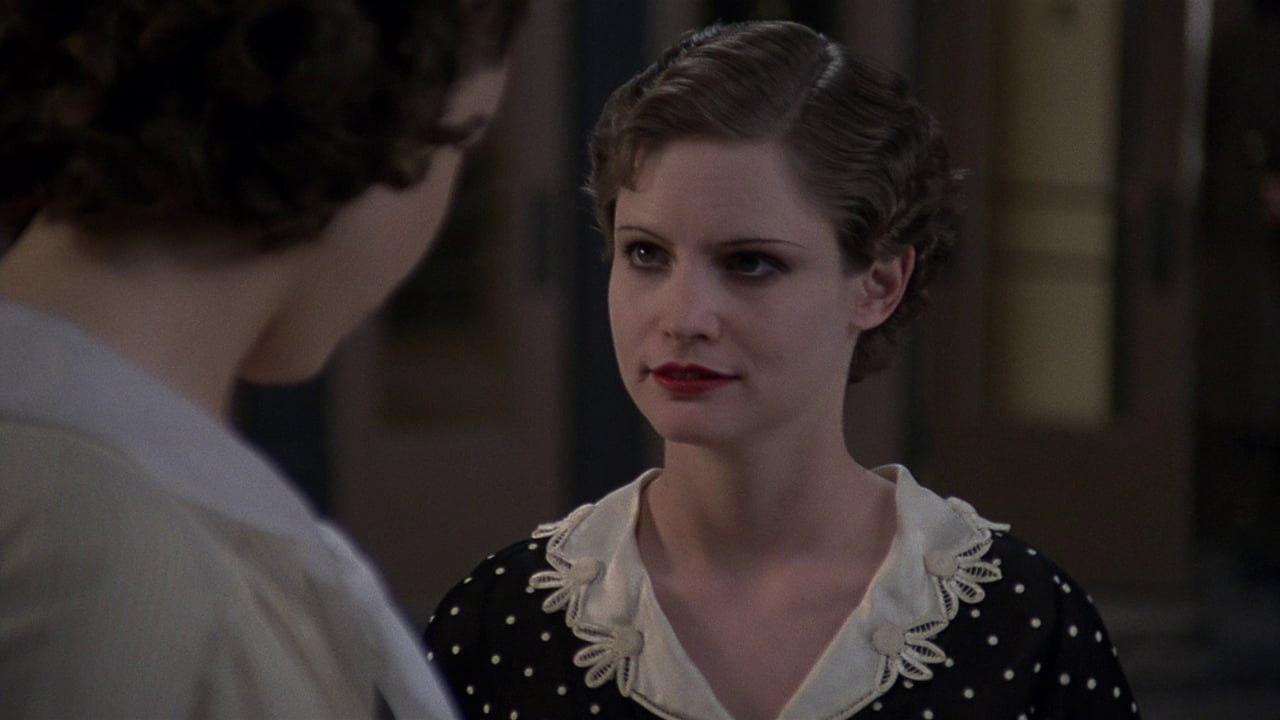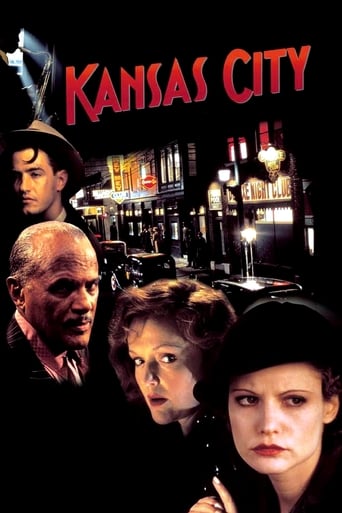tieman64
"You know what I didn't do today? I didn't vote." – Carolyn StiltonI absolutely hated "Kansas City" upon first viewing. Its pace seemed strange, its flashbacks seemed oddly placed, its camera seemed to dwell on unimportant details and none of its characters seemed to exist to propel any clearly defined story forward. In other words, though I'd seen virtually every other Robert Altman film, "Kansas City" still left me in a state of bewilderment.But as is often the case with Altman, "Kansas City" began to make sense - in so far as Altman desires to make sense; his films seem to embrace a certain chaos - upon second viewing. Filled with loving shots of jazz musicians, the film is itself a jazzy tone poem, Altman coming at the audience from odd angles, asking us to pick up on his shifting rhythms of plot and character, themes of race, politics, violence and money. Consider the subtle juxtapositions Altman weaves into the film...A poor white man (Johnny O'Hara) paints his face black and robs a wealthy black man. Seeking assistance, the black man visits a powerful black crime boss called Seldom Seen. Seldom agrees to help, kidnaps Johnny and kills him.In contrast, Johnny's wife (Blondie O'Hara) kidnaps a wealthy white woman (Carolyn Stilton) while she applies a white beauty mask. Carolyn is married to Henry Stilton, a powerful politician. Blondie wants Henry to negotiate with the crime lord so that she may get her husband back. Blondie is eventually killed by Carolyn Stilton. While this drama is unfolding, other characters enter the mix. A young Charlie Parker, years away from musical fame, finds a pregnant black girl. He takes her to a maternity ward. Meanwhile, we learn that Blondie had her baby aborted because Johnny didn't want kids.Similarly, a poor black cab driver (who helped Johnny stage his robbery) is taken to a back alleyway and killed by Seldom and his gang. In contrast, Henry Stilton's goons kill a white man in broad daylight because he was hampering their efforts to falsify local election ballots.And so on and on it goes, Altman juxtaposing his jazz notes, "Kansas City" less a linear narrative than a series of contrasting sequences or oppositional musical riffs, some obvious, some subtle, but all revolving around class, race and gender. Blackface paint is mirrored to white beauty cream, black crime lords are mirrored to corrupt white politicians, political thugs are mirrored to violent gangsters, abortions are mirrored to pregnancies, loving marriages are mirrored to loveless couples, poverty is mirrored to power, underground gambling joints and brothels are mirrored to above ground poll booths and ballot stations.Blondie O'Hara, the young kidnapper, is herself contrasted with Carolyn Stilton, the woman she kidnaps. Blondie loves her husband and would do anything for him. Mrs Stilton, in contrast, is constantly doped up on opium and has long given up on her marriage. Furthermore, Blondie is constantly emulating Kansas City native Jean Harlow, an actress whom she idolises. This notion of "narrative emulation" is itself intended to mirror the "cutting contests" between the jazz musicians sprinkled throughout the film. Just as the musicians borrow from one another and weave each other's material into what they are improvising, Blondie borrows from the movies and weaves Harlow's tough girl phrases and expressions into her conversation. But Blondie's toughness is all a facade, a suit of armour used to compensate for her petite size and coarse environment. While Blondie gives up her child and is constantly subservient to her husband, it is Carolyn Stilton who possesses true strength. Despite her permanently doped up state, Carolyn constantly gives the impression that she knows more than she's letting on, always absorbing information and assessing her surroundings. Her final line, "I didn't vote", itself lets us know that she has long cut herself off from a venal world which she refuses to legitimize.And so with "Kansas City" - a film which ends with a crime lord counting money in the dark corners of a jazz club - Altman has abstracted the politics of power and persuasion, threat and privilege. Everything in the film hinges on social power, Altman drawing a clean line between those violent people who wield power and all those pathetic dreamers who try to grab it but never succeed in doing so for more than a fleeting moment.The political corruption of the city's democratic machine (the country was built on voting fraud and rigged elections; practises common even today), and the expanding influence of Hollywood (and the power of film to seduce and destroy people such as Blondie), is as important to Altman as the racial segregation that produces Kansas City's two worlds: the white world, dominated by the Stilton's, and the inverted black world of Seldom Seen, a vampiric world of music which seems to only come to life long after the surface world has gone to sleep.The film is also unique in the way it offers jazz music an unprecedented role within the diegetic world. This music is constantly "seeping into" he story, providing a kind of tapestry for the characters to perform against. The result is that the jazz music seems to become intertwined with the very social climate that influences it. Altman himself has said that it was his intention that jazz be the structure of the entire film. Whilst a typical song lasts 3 minutes, a jazz tune lasts as much as 17, the effect being that many of the film's scenes are elongated and purposefully stretched out. "Seldom Seen is like a brass instrument," Altman says, "when it's his turn to solo, he does long monologues and riffs. But the discussions of the two women are like reed instruments, saxophones having duets."8/10 - Best appreciated as a kind of cinematic jazz, the plot lethargically frustrating as it intrigues.
ap1704
These comments about the movie and a question. I enjoyed the movie, the music , and the "feel" of the film. It seemed very authentic: the sets, the lighting, costumes and the extras in the background. Also the social atmosphere that was presented in the film of class, race and economics was very effective. I was mesmerized watching as the film progressed. However, I am at a lost as to what it was about when it got to the end. Can anyone please explain the ending? I saw the movie twice and must have missed something. Why did the politician's wife kill the crook's wife? How did her husband know that this would happen and was outside the house waiting for his wife, who wordlessly gets in the car with him. Thanks.
S.R. Dipaling
Robert Altman's depression-era flick,set in his hometown,is a somewhat tangled,hard to embrace film that is long on authenticity and substance but short on "hooks" that is going to get the average viewer.The characters are tough to develop any real feel for. Unhinged and desperate,Blondie O'HAra(Jennifer JAson Leigh) kidnaps a rich,heavily soused politician's wife(Miranda Richardson,who's very strong here) with the misguided idea that this will free her dense,scheming boyfriend/husband JOhnny(Dermont Mulroney,who barely speaks in this film). She ends up crossing both the Black gangsters of the town,led by a charismatic tough called Seldom Seen(HArry Belafonte) and the political machine that she's trying to manipulate. The results are fairly predictable;it's the interplay between Blondie and Mrs.Stinson as Blondie tries to wait out her scheme that becomes of more interest. Along the way,you get a brief glimpse of the violence,corruption and poverty that is rampant in the area in the post-Prohibition,pre-WWII urban Midwest. Steve Buscemi's turn as a loud-mouthed saloon owner and Pendergast machine lackey who is married to Blondie's sister is strong(As most of his turns in films are)and way too brief. IN sum,this movie is a worthy watch,but ONLY if one is willing to ride along with the difficult situation as it is laid out. I have not seen that many Altman movies,but I would say I got more out the stories of THe PLayer,Short Cuts or (my personal fave)Cookie's Fortune. The music,however is very strong and practically takes a life of its own,as no fewer than nine established jazz musicians(Kevin Mahogany,Cyrus Chestnut,Ron CArter among them) jam on tunes of(or styled around)the era. If you enjoy jazz,this film--and even more so the soundtrack--is a must to watch and listen.

